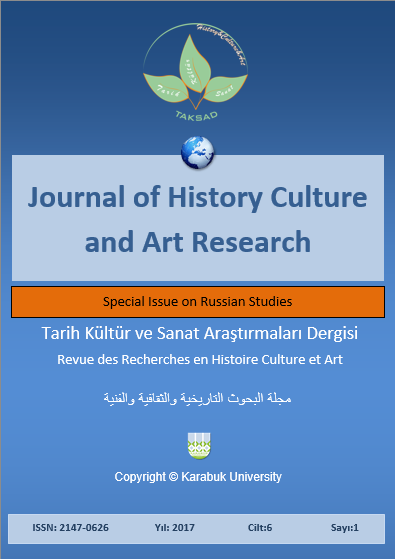"Oriental Component" and Socio-Cultural Environment in Kazan in the Early 1920s
DOI:
https://doi.org/10.7596/taksad.v6i5.1306Keywords:
History, Cultural history, Ethnography, Sociocultural environment, N. Katanov.Abstract
This research investigates some aspects of a sociocultural situation in Kazan in the first years of the Soviet power. The research is conducted in the context of development of musical culture and education. The main method is biographic, and the institutional biography with the emphasis on the identity of orientalists, especially Nikolay Katanov is considered (1862-1922). The major conclusion is that all major actions of the Soviet power in the field of music education were prepared by processes in orientalist community, since the end of the 19th century. It is shown that representatives of suburbs of the Russian Empire gave help to capital scientists in carrying out researches and began to have significant effect on representations of the teachers. This influence readily admitted, as well as full equality. An example is the scientific and cultural environment of Kazan in which interest of the authorities, served musical and scientific community to culture of the people of the East as an incentive to creation in Kazan of the first special musical facility - East conservatory in 1921. Materials of the research are of interest as to researchers of the sociocultural environment in Russia in the 1920th years, and to historians of culture and music education.
References
Faizrakhmanova, L. T. & Kovrikova, E. V. (2017). The Ethno-Confessional Relations in the Context of Culture and Education (Kazan province, XVIII - beginning of XX century). Bylye Gody, 43(1), 30-39.
Huntington, S. P. (2011). The Clash of Civilizations and the Remaking of World Order. New York: Simon & Schuster Paperbacks.
Khalid, A. (1998). The Politics of Muslim Cultural Reform: Jadidism in Central Asia. Berkeley: University of California Press.
Martynova, Yu. A. (2013). The system of secondary specialized music education in Kazan (1917-1960): Formation and development. Ph.D. dissertation. Kazan, Kazan State University of Culture. (In Russian)
Repina, L. P. (2011). History at the border of the XX-XXI cc.: Social theories and historiographical practices. Moscow: Krugh. (In Russian)
Rorlich, A. A. (2017). Volga Tatars: A Profile in National Resilience. Stanford: Hoover Institution Press.
Safiullina, E. Yi. (2014). Revisiting the collection of Tatar musical-ethnographic materials by the teachers of the Kazan ecclesiastical academy in the context of their missionary-educative activity (19th century). Terra Sebus: Acta Musei Sabesiensis, Special Issue, 45-53.
Safiullina, E. Yi. (2014). The Role of the Emperor's University of Kazan in the History of Formation of Tatar Musical Ethnography (XIX - Early XX Century). Bylye Gody, 31(1), 99-102.
Tolz, V. (2011). Russia’s Own Orient: The Politics of Identity and Oriental Studies in the Late Imperial and Early Soviet Periods. Oxford University Press.
Valiahmetova, A. N.; Salpykova, I. M. & Nurgayanova, N. K. (2014). Music teacher to-be tolerance formation in the multicultural educational environment by means of musical art. Life Science Journal, 11(9), 396-400.
Downloads
Published
How to Cite
Issue
Section
License
All papers licensed under Creative Commons 4.0 CC-BY.- Share — copy and redistribute the material in any medium or format
- Adapt — remix, transform, and build upon the material for any purpose, even commercially.
Under the following terms:
Attribution — You must give appropriate credit, provide a link to the license, and indicate if changes were made. You may do so in any reasonable manner, but not in any way that suggests the licensor endorses you or your use.
- No additional restrictions — You may not apply legal terms or technological measures that legally restrict others from doing anything the license permits.







